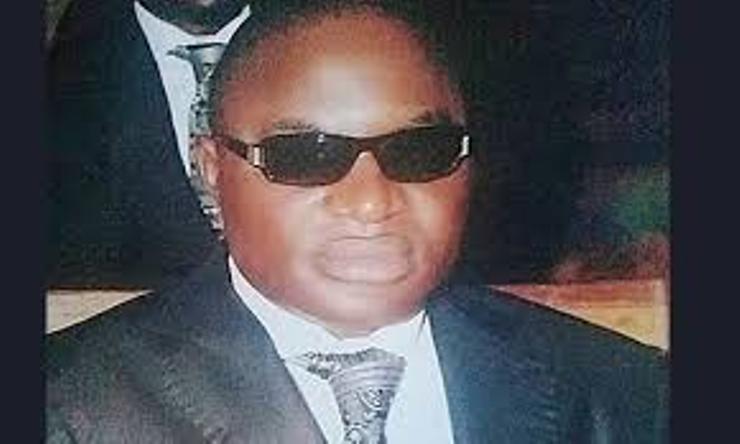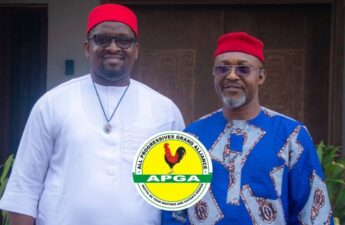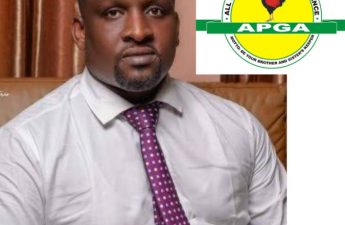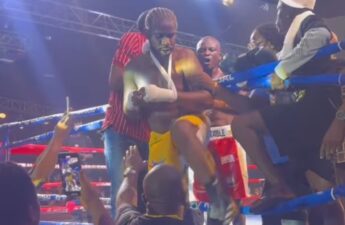A legal practitioner known as Chikwe Nnamani from Akpugo, Nkanu West Local Government Area of Enugu state has narrated how a gunshot injury he suffered at the age of five changed his life forever.
In an interview with Alexander Okere, the 47-year-old advocate in the Enugu State Ministry of Justice reveals the challenges he faces as a visually-impaired lawyer, the mountain he had to climb to get married and how his disability stands between him and some of his ambitions.
Follow the conversation below.
Have you been living with visual disability since you were born?
No, I wasn’t born blind; it was by accident.
How did it happen?
It was a gunshot accident that happened sometime in 1977 at a funeral when a man fired a gun, which accidentally inflicted injury on about five of us. I was the only person affected in the eyes. I was taken to a hospital and that was the beginning of my switching over to getting education for the visually-impaired.
What was your reaction when you realised that you could not see?
I was very young and couldn’t realise what was actually happening. But when I was old enough to realise that I was in a different situation from every other person around, I had already become familiar with the environment around me. So, it wasn’t a big problem to me, even though I knew I was different from my siblings. But they were very cooperative, having seen the person in me. I wasn’t that kind of a person that usually waited for people to do things for them. Despite my circumstance, I used to run around with my siblings and other peers.
When you think about your condition, it probably reminds you of the man who fired the gun. Have you forgiven him?
When I grew up to know that it (visual impairment) was a problem, I had no option but to forgive him because I ought not to have gone back to shoot him in retaliation. My circumstance did not allow me to think about that and my people were free enough to carry me along.
As a little boy who couldn’t see, did you have any difficulty interacting with your peers?
There were limitations, rather than difficulties. For instance, when we played football, they usually passed the ball to me and let it touch my feet so that I could kick it and have that feeling. But I knew I didn’t get it right as they did. But in the institution of higher learning, some people felt I could not cope with social life. Sometimes, when they wanted to attend parties, they didn’t bother me to join them but narrated the event to me.
Can you tell us the schools you attended?
I attended Special School for the Blind at Oji River in Enugu. When I got to the school and was given Braille to use to learn and told that I would have to use it for the rest of my life academically, I was very surprised and wondered how I would read with something that felt like sand on paper. But as time went on, I discovered that I could do it because I was taught and, through God’s kindness, I learnt very fast.
Social life within the school was wonderful because we did everything by ourselves, even as visually-impaired persons. I remember when our tap stopped functioning. We used to go to one of the streams near the school to fetch water and nobody led us. I also attended College of the Immaculate Conception, Enugu, and studied Law at the University of Jos, Plateau State.
Was it your intention to study Law?
Actually, I didn’t set out to study Law; what I was ready to study was Political Science but I made Law my second choice while Political Science was my first choice. But when I went to the University of Nigeria Nsukka, I was told that the school had exhausted the space for those who wanted to study the course. The available option for me then was Law and I had to go for that. That was how I went to Jos. Initially, I didn’t go into it with keen interest but at a point, I started thanking God.
Are you are a practising lawyer?
Yes, I am; I go to court, sometimes. Some of the judges would look at one with great expectation because they have never had a visually-impaired lawyer in their court. I argue my case. But I primarily work in the state Ministry of Justice.
How did you manage the challenges that came with the disability?
The challenges are more emotional. For instance, when you fall into a pit or a gutter, you may get wounded and you would have no option but to come out and console yourself emotionally because it could have been so for any other person. People who have their sight could fall into a gutter let alone those who can’t see. In the university at that time, there were facilities. What we (three of my visually-impaired colleagues and I) usually did was to go to the classroom with a tape recorder to record the lectures and played them when we got home and made our notes into Braille. For the handouts that most of the lecturers gave, we called on our sighted friends to read out the contents so that we could record them into tapes.
What is the worst form of discrimination you’ve faced?
I have faced a lot of discrimination. When I wanted to get married, a lot of questions were raised whether I could do it. But the issue was about the position of the woman I wanted to marry – whether she was okay by it or not. But we got married and I have three children for now. The challenge is mostly in the area of marriage.
How did that affect you?
If I had succumbed to it, I probably wouldn’t have been married at the time I did or married the woman I chose. When you are approached with that kind of discrimination, you try to come up with a solution by yourself, otherwise you would be weighed down by people’s insinuations.
What would you say disability has cost you?
I know that God has a destination for everybody and has a way of controlling an individual. But if I were to be as normal as every other person or had my sight like every other person, you would probably be talking to me as a governor or one of the ministers in the country; I mean I would have gone the extra mile. But because of this circumstance, sometimes, I realise that I might not be able to reach the level where my mates are.
So, what has your condition taught you?
Disability has taught me to be a patient person and believe that I have my decision but God has the final say. Sometimes, when I feel that my disability is limiting me, I realise that when I rely on God, I see myself through that.
How did you meet your wife?
When I started looking for a wife, I went to a prayer centre and met her. But it was not the type of meeting that people claim God told them to marry a particular person. I used to go to the centre with my sister and it was my sister who saw the lady, admired her and wished that I married her. When she told me, my wife and I introduced ourselves and discovered that we came from the same community. At the initial stage, there was some resistance. But all those who resisted discovered that they were on the wrong path and had no option but to support us. Her parents were cooperative but some of her relations initially had some reservations. However, they eventually agreed.
Do you have faith in the Disability Act to bring the changes desired by persons with disabilities?
I do, at least, for a start. There may be some amendments here and there in the future. But for now, if that Act is religiously implemented, it is going to take care of most of the problems, as far as discrimination is concerned. The bill was signed into law early this year. But the implementation commission has not been set up. Without it, you can’t say the implementation of the law has commenced. So, I will like the government to take the bull by the horns and see how it can, as urgently as possible, set up that commission because it will be the driving force of that law. Without it, I don’t think the implementation will commence in earnest.
Culled from Punch



